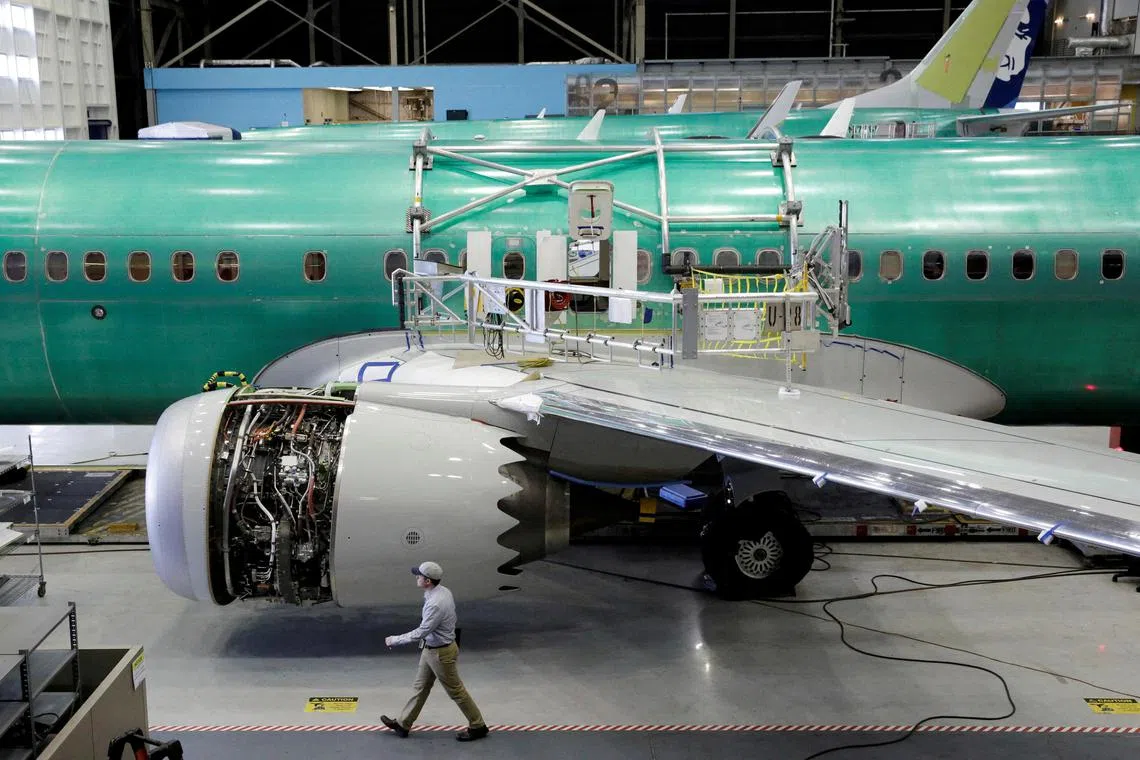Boeing to pause 737 production for quality stand-down on Jan 25
Sign up now: Get ST's newsletters delivered to your inbox

The first stand-down will occur at the Renton, Washington-area factory where the 737 is built.
PHOTO: REUTERS
WASHINGTON – Boeing will hold a quality stand-down on Jan 25 at the Seattle-area location where it makes its 737 aircraft, pausing production and delivery operations for a day, the company announced on Jan 23.
During the stand-down, employees will attend quality workshops and “pause, evaluate what we’re doing, how we’re doing it and make recommendations for improvement,” said Boeing Commercial Airplanes president Stan Deal.
The first stand-down will occur at the Renton, Washington-area factory where the 737 is built. All other Boeing commercial production facilities and fabrication sites will have stand-downs over the next few weeks, Boeing said.
Boeing announced it would hold sessions with workers on Jan 16 as part of a larger list of actions it is taking after the grounding of a portion of the 737 Max 9 fleet earlier in January following a midair cabin panel blowout on an Alaska Airlines jet.
Boeing chief executive Dave Calhoun will meet US senators to answer questions about the 737 Max 9 grounding, as executives for long-time customer United Airlines raised questions over billions of dollars of orders for Max 10 jets.
Mr Calhoun is set to hold meetings starting on Jan 24 on Capitol Hill. He is scheduled to meet senators Ted Cruz, Mark Warner and Maria Cantwell, who chairs the Commerce Committee. Last week, she said she plans to hold a hearing after the Federal Aviation Administration (FAA) grounded 171 Max 9 airplanes.
Ms Cantwell and Mr Cruz held a closed-door briefing last week on the grounding with FAA administrator Mike Whitaker and National Transportation Safety Board chair Jennifer Homendy.
Numerous lawmakers on Capitol Hill have questioned Boeing. The company told senators Ed Markey, J.D. Vance and Peter Welch in a previously unreported Jan 17 letter that it was working to “restore trust with our regulators and our customers”.
United Airlines CEO Scott Kirby said on Jan 23 that the airline, which has ordered 277 Max 10 jets with options for another 200, would build a new fleet plan that does not include a model already mired in regulatory and delivery delays.
The FAA grounded most of Boeing’s Max 9 jets for checks after a plug replacing an unused exit door tore off an Alaska Airlines jet on Jan 5, forcing an emergency landing.
Industry watchers have been seeking concrete signs that Boeing’s woes with the Max 9 and the legacy of earlier Max safety groundings are undermining support for the larger Max 10, which makes up more than a fifth of outstanding Max orders.
“I think the Max 9 grounding is probably the straw that broke the camel’s back for us,” Mr Kirby said in an interview with CNBC on Jan 23.
The Max 10 does not have the same kind of door-plug system as the Max 9, but the grounding has raised concerns that the incident could delay regulatory approval and delivery of the Max 10, as well as temper broader plans for higher production.
Alaska Airlines CEO Ben Minicucci said the airline found “some loose bolts on many” Max 9s during inspections in an interview with NBC News that aired on Jan 23. The FAA is still reviewing data from inspections of an initial group of 40 planes and has not said when it may allow the grounded Max 9 jets to resume flights.
The FAA on Jan 21 urged operators of 737-900ER planes with door plugs to immediately inspect them after some airlines had noted “findings with bolts” during maintenance inspections.
Max 10 delays
After disappointing Max 9 sales, Boeing is betting on the larger-capacity Max 10 to dent the runaway lead of Airbus’ A321neo at the busiest end of the market.
Analysts say a full roll-out of the Max line-up is crucial to help Boeing stabilise its roughly 40 per cent share against Airbus and generate sufficient cash.
In the best-case scenario, Max 10 deliveries are five years behind their original delivery date, Mr Kirby estimated.
He later said United would not cancel the jets but would remove them from internal plans. Industry experts say airlines rarely cancel orders for fear of losing deposits, but often juggle models or else use public pressure to help win concessions.
Mr Deal said in a statement that the planemaker had “let down our airline customers and are deeply sorry for the significant disruption to them, their employees and their passengers”.
While Mr Kirby’s remarks left questions hanging over Max 10 orders, industry sources said United also faces a dilemma as it races rivals to meet rising demand.
Airbus is sold out for similar planes until around 2030.
“It is not helpful for the Max 10 when United, holding orders for 26 per cent of the entire known Max 10 backlog, says this,” said Mr Rob Morris, head of global consultancy at Ascend by Cirium.
“But what will United do instead?“
Airbus declined to comment.
GE ‘confidence’
Some commentators have called for changes in Boeing’s top management and some airline executives also have been privately calling for a reset.
In January, people familiar with the matter told Reuters that United had become “incensed” with a supplier with which it shares corporate roots. It has been forced to ground 79 Max 9 jets for which it had sold seats and on Jan 22 warned of a hit to first-quarter results.
But CEO Larry Culp of Boeing’s largest engine-maker GE Aerospace threw his weight behind Boeing’s leadership.
“They’re an important customer. They’re an important partner,” he told Reuters, adding that he and Mr Calhoun were “in frequent communications on a whole range of issues”.
Asked if he had confidence in the ability of Boeing’s leadership to fix its problems, Mr Culp said: “I have confidence.” REUTERS


